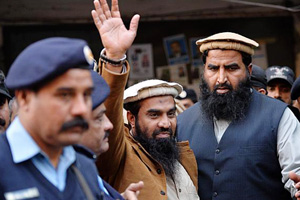Lahore, Apr 9: A Pakistani court today suspended the Punjab government's detention order against 2008 Mumbai attack accused and LeT operations commander Zakiur Rehman Lakhvi under a public security act and ordered his immediate release.
Justice Muhammad Anwarul Haq of Lahore High Court suspended the detention of 55-year-old Lakhvi under Maintenance of Public Order after the government failed to present sensitive records against him in the court.
The judge ordered Lakhvi to submit two surety bonds worth Rs 1 million each for his release.
"The law officer had submitted important information about Lakhvi, but the court did not accept this and declared the evidence unsatisfactory," an official of LHC told PTI.
Justice Muhammad Anwarul Haq on the last hearing on April 7 had directed the government's counsel to submit record of secret documents about activities of Lakhvi today.
Lakhvi had challenged the March 14 order of Punjab government's District Coordination Officer, Okara to detain him for 30 days.
Lakhvi's counsel Raja Rizwan Abbasi argued that after the LHC's earlier direction he had filed a representation before the Punjab home secretary against his "illegal" detention but the home secretary dismissed it and upheld the 30-day detention order issued by District Coordination Officer, Okara.
Abbasi pleaded that a person could not be detained beyond 90 days without obtaining an order from review board and the detention period of his client had gone beyond 90 days.
A provincial review board comprises judges of the high court.He pointed out that trial court had released Lakhvi on bail in December 2014, however, District Magistrate of Islamabad issued detention order against him.
Later, Islamabad High Court set aside Lakhvi's detention and ordered the government to release him.
However, another detention order was issued by the DCO Okara and he was not released, the counsel argued.
He had pleaded the court to strike down the impugned order and order the government to release Lakhvi.
India had earlier strongly reacted to the IHC's ruling on March 13, saying the overwhelming evidence against Lakhvi has not been presented properly before court by Pakistani agencies.
Lakhvi and six others – Abdul Wajid, Mazhar Iqbal, Hamad Amin Sadiq, Shahid Jameel Riaz, Jamil Ahmed and Younis Anjum – have been charged with planning and executing the Mumbai attack in November, 2008 that left 166 people dead.
Lakhvi, believed to be a close relative of LeT founder and Jamat-Ud Dawa (JuD) chief Hafiz Saeed, was arrested in December 2008 and was indicted along with the six others on November 25, 2009 in connection with the 26/11 attack case.
The trial has been underway since 2009.






Comments
Add new comment